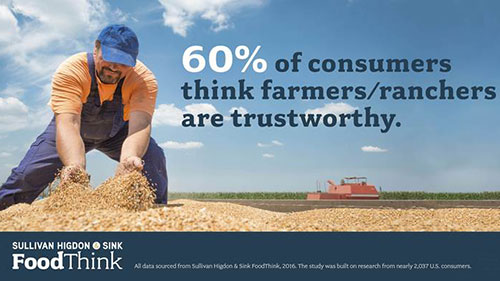
Some days we think people are so naïve to believe everything they read. Other times, they are so skeptical of even the most logical and safe practices. I laughed when I read a post on Facebook on April Fool's Day. The post poked fun at those who only question what they read on the first of April, assuming all other information is 100 percent truthful the other 364 days.
Not everything you read or hear is factual, not everything you read or hear is a falsehood. It takes common sense and some research to learn the real story if you question a statement. Some will take the time to learn, while others choose to continue to run with the taken-out-of-context statements because they are a "juicier" story to tell.
But, what do consumers really think about food production? "Evolving trust in the food industry" is a white paper that was recently published on the topic of consumers' trust in the food industry.
The study showed that about one-third of consumers think that the agricultural community and food companies are transparent. By sharing information about our practices we gain trust. In other words, that also means two-thirds of consumers think we are trying to hide information. With that statistic, we have a lot of work to do. Those that need the most convincing? The Boomers and those that rate their cooking skills as fair/poor. Interesting target groups . . .
Nearly two-thirds of consumers want more food production knowledge. Wanting to know more about food production was most likely a yes or no question. So, on a basic level, people are curious. This is a huge positive. Those that want to learn are receptive to information – we want to reach those who are open to learning.
However, I would be more interested in the type of information they want to know. Are they looking for a Crop Science 101 class with details in planting, harvesting, and processing or a basic animal husbandry course? Are they looking for the faces that picked the peaches, the farmer that drove the tractor, or the child that fed the meat animal project that eventually landed on their dinner plate?
Is it the science or the sentiment that interests them?
The good news is that the consumers' perception of ag has increased since Sullivan Higdon & Sink has been preparing their FoodThink white papers. Food companies, the agricultural community, bloggers/social media, and grocers have seen a large gain in consumer trust since 2012 for providing accurate information – in the consumers' eyes. The report believes the attention and discussions about food by consumers combined with ag's willingness to be more open has driven the numbers upward. Keep the conversations going, with friends, relatives, colleagues, teachers, people at the grocery store, and Facebook posts so all are confident in the food choices they make.

The author is the online media manager and is responsible for the website, webinars and social media. A graduate of Modesto Junior College and Fresno State, she was raised on a California dairy and frequently blogs on youth programs and consumer issues.








